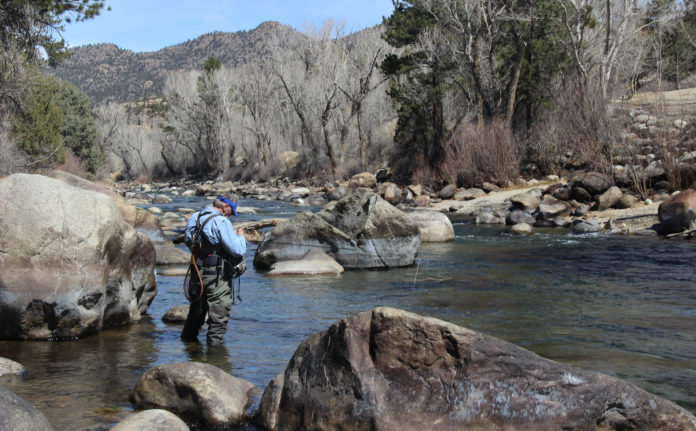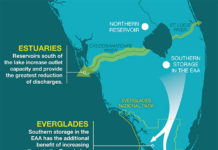This story was originally published by High Country News and is reproduced here as part of the Climate Desk collaboration.
The first rock hurtled past Roger Hill’s head and plunked into the Arkansas River on a summer day in 2012. Hill, then 71, stood hip-deep in the flow, clad in waders, and clutching his fly rod. Atop a steep bluff, a woman — whose name, Hill later learned, was Linda Joseph — glowered down at him. Hill was trespassing on private property, Joseph shouted, and flung another rock. “If she’d hit me with a baseball-sized rock from 50 feet up, honest to God, it would have killed me,” Hill recalled.
Hill retreated, but the dispute was only beginning. The next time he waded to his favorite spot, some 20 miles upstream of Cañon City, Colorado, Joseph’s husband, Mark Warsewa, left a note on Hill’s car that threatened him with arrest. Hill stayed away, but in 2015, two of his buddies returned to fish. Warsewa emerged from his riverfront home with a handgun and fired a shot in their direction. The bullet struck the surface a mere 15 feet from the anglers.
Although Warsewa got 30 days in jail for his stunt, the issue that sparked the conflict remains unresolved: Who owns the beds of Colorado’s rivers?
From a river-access standpoint, Colorado is among the West’s oddest states. Federal law dictates that the beds of “navigable” rivers — waterways once used as highways for commerce — belong to the states, which, in turn, generally allow boaters and anglers to use them. Idaho, for instance, grants public access for “all recreational purposes,” including angling on foot, on any river capable of either carrying cut timber or “being navigated by oar or motor.” Washington permits fishermen and other members of the public to wade streams deep enough to float “a bolt of shingles.”
By contrast, Colorado has historically denied that it even has navigable rivers. In 1912, the state’s Supreme Court opined that the state’s waterways — steep, rushing, canyon-bound — were “nonnavigable within its territorial limits.” By that logic, the beds of even major rivers belonged not to the state, but to the owners of adjacent private properties, who often didn’t look kindly on the intrusions of the hoi polloi. When, in 1976, a group of rafters drifted past a ranch that abutted a shallow stretch of the Colorado River east of Kremmling, they were convicted of trespassing for having the audacity to occasionally bump the bottom. In the aftermath, many of the state’s landowners and recreators struck a delicate, informal agreement: You could float through private land, but you couldn’t touch bed or bank.
Hill, however, prefers to do his fishing on foot. In 2018, he sued Joseph and Warsewa for access to the Arkansas where it flowed past their property; later, he added the state of Colorado to his suit. Contrary to conventional wisdom, Hill believes, the Arkansas River was historically navigable, and its bed thus belongs to the public. And while his case applies only to the river that locals affectionately know as the Ark, it could ultimately affect waterways throughout Colorado, where the public has never craved outdoor opportunities more. “We don’t have enough quality recreational opportunities to satisfy demand today,” Hill told me. “There are waters I’ve wanted to fish for 50 years, and I’ve been denied the use of a state-owned resource.”
One April morning I met Hill at a public easement on the Arkansas River near the town of Buena Vista, 60 miles upstream from where he’d been pelted with rocks. Hill’s face was sun-chapped, his silver hair tousled by the spring gusts that bedevil Colorado’s anglers. He wore wading boots from the gear company Patagonia, which had caught wind of his case and sent some supportive swag. Hill hoped the new footwear would keep him upright in the Ark’s stiff flow. “When you read my obituary, the first line is going to be, ‘A man his age should have had better sense than to wade the river where he did,’” he said.
Hill fished with an admirable economy of motion, a precision to which my flailing limbs could only aspire. He cast crisply into seams and riffles, chewing gum and stripping line in metronomic rhythm. Although few fish were rising, he tied on a dry fly of his own making — the design of which, he informed me, was strictly off the record — and coaxed a bite from a lovely brown trout freckled in vivid red and black. “There’s one looking up, at least,” he said as I netted his fish.
Hill, who grew up in Oklahoma, came of age fishing the Midwest’s limestone creeks in cutoff jeans and tennis shoes. But his angling career began in earnest in 1967, when he moved to Colorado Springs to work as a nuclear physicist for a weapons manufacturer. He approached fly-fishing like a scientist, poring through entomology textbooks to understand the life cycles of mayflies and midges, then bending over his fly-tying vise to imitate their manifold forms. Although his career later wandered into real estate and used cars, his studious devotion to angling never wavered. “Something as simple as adding another foot of tippet” — the fine, translucent line to which anglers tie their flies — “may be the difference between success and failure,” he wrote in one guidebook.
While Hill fished all over the West, he had a special affection for the Arkansas River, the snow-fed torrent that tumbles down from the Sawatch Range, rolls east through central Colorado, and, nearly 1,500 miles later, spills into the Mississippi. In the early 2000s, at a local guide’s suggestion, Hill began fishing the Ark’s confluence with a tributary called Texas Creek, a prime spot graced with ample rocky trout habitat. Although a tony subdivision squatted on the bank nearby, he never had a problem with its homeowners — until Linda Joseph began chucking rocks at him in 2012.
Hill was adamant that he had a right to the river. His rationale was rooted in the “equal-footing doctrine,” a legal principle that, in theory, granted Colorado ownership of any river that was navigable at statehood in 1876. But was the Arkansas truly navigable? Hill scoured newspaper archives and found dozens of references to industries employing the river as a commercial highway. In 1813, a beaver trapper named Ezekiel Williams canoed down the Ark with bales of pelts, and in the 1870s, railroad companies floated thousands of wooden ties from the river’s headwaters to the town of Pueblo. “If building a railroad ain’t commerce, I don’t know what’s commerce,” Hill said.
Hill has not yet had the opportunity to present his evidence, though. After he filed suit in 2018, his case bounced between jurisdictions as the defendants, including the state, contested his standing. In January 2022, Colorado’s Court of Appeals finally ruled that Hill had standing to take the case to trial. The ramifications could be immense: If a court eventually decides that conveying railroad ties and pelts makes the Arkansas navigable, then other rivers in the state — the Yampa, the Roaring Fork, the Dolores, and the Colorado, to name a few — may also qualify. “There’s a lot of places where people could apply this legal precedent and consider similar challenges,” said John Gale, conservation director for Backcountry Hunters & Anglers.
These repercussions explain why Hill has attracted as many opponents as supporters. A panoply of interests — including homeowners’ associations, water providers, and the city of Colorado Springs — have joined the case against him. He’s also encountered resistance from Colorado’s attorney general, Phil Weiser, who has accused Hill of engaging in a “coordinated effort” to upend property rights on rivers around the state. By siding with Hill, Weiser has written, the Court of Appeals could disrupt “long-settled and carefully balanced rights” on the Arkansas and beyond. (Weiser’s office declined to comment for this story.)
Most displeased, perhaps, are riverfront property owners. Among the entities who filed briefs opposing Hill is the Colorado arm of Jackson-Shaw, a Dallas-based development company that purchased nearly two miles of land along the Taylor River near Gunnison in 2007 to create a “private fly-fishing property sanctuary.” Jackson-Shaw is no stranger to access disputes: Even rafting through the development, the company’s chairman has written in the past, is akin “to someone walking across your front lawn on a short cut to the grocery store.” In its brief on Hill’s case, the developer noted that it made “substantial financial investments” in enhancing fish habitat on its Taylor property; modifying privately owned riverbeds and controlling who gets to fish them, the company added, represents the “lifeblood” of dude ranches and private angling clubs. A victory for Hill, it wrote, would cast a “dark cloud” over riverbed owners around the state. (Jackson-Shaw and its Taylor River development didn’t reply to my requests for comment.) “If we were to win, it would upset the claimed rights that some of these landowners have to keep the public riff-raff off what I consider to be public streams,” said Mark Squillace, Hill’s pro-bono attorney, who is a professor of natural-resources law at the University of Colorado Boulder.
Lyn Alweis / The Denver Post via Getty Images
Some Colorado water managers are just as concerned as the state’s developers. Who owns Colorado’s riverbeds is, of course, a different question than who owns the water that flows over them: As Hill put it, “Not one drop of water will ever have its ownership or use changed, end of discussion.” That doesn’t much mollify Terry Scanga, general manager of the Upper Arkansas Water Conservancy District, a group that manages water in the Arkansas Valley and advocates for its water-rights holders. Hill’s suit is predicated in part on the public trust doctrine, the notion that certain resources are so important that they should be stewarded by the government for public use. If Colorado declares its riverbeds subject to the public trust, Scanga argues, the state could someday apply similar logic to water itself, upsetting the ancient “first in time, first in line” system for allocating rights.
“It’s not the wading itself that’s the key here,” Scanga told me. “It’s the basis upon which you get the right to do that. It raises a whole bunch of potential legal issues in the future — big ones.”
Here might be a good moment for a confession: I’m not an entirely disinterested party in Hill’s case. I recently moved to the Arkansas Valley after living for years in the inland Northwest, where I did most of my fishing in Montana, an angling mecca where state law permits fishermen to wander down any stream they choose, navigable or not. Upon my return to Colorado, I was taken aback to find the Arkansas lined with NO TRESPASSING signs. About 30 percent of the Ark is privately owned, and, while it boasts more public access than many state waterways, barbed wire seemed as abundant along some stretches of bank as cottonwood trees.
Nor is the Arkansas the only Western river where recreators and landowners have become embroiled in stream access battles. In 2010, the Utah Legislature barred the public from wading non-navigable waters through private property, effectively closing more than 40 percent of the state’s miles of fishable streams; although anglers and boaters sued, a judge upheld the law last year. Access advocates have had more success fighting back in New Mexico, where the state’s Game Commission passed a rule in 2017 that allowed landowners to preclude the public from streams deemed non-navigable. Fence-and-wire barricades promptly popped up on the Rio Chama and the Pecos River — the latter erected by Hersh Family Investments, a Texas-based equity fund. “An unsuspecting floater getting swept into that, it’s a really hazardous place to be,” said Norm Gaume, a board member of the Adobe Whitewater Club. The club and other groups challenged the rule, and, in March 2022, the New Mexico Supreme Court deemed it unconstitutional after deliberating for all of 15 minutes. “There was a lot of celebrating in Santa Fe,” Gaume said.
This preponderance of cases testifies, I think, both to the murkiness of river law, and to the hoary philosophical differences about the nature of rivers themselves — who they’re for, what they even are. Are riverbeds a category of land like any other, subject to privatization and enclosure? Or are they fundamentally unlike land: shared spaces for spiritual renewal and joy, rendered so precious in the West by their scarcity that it would be unjust to deny the public their pleasures? It’s no coincidence, perhaps, that the current slew of stream-access cases arrives at a fraught moment in recreational history, one in which we’ve sought the solace of rivers more desperately than ever. The public’s appetite for fishing — an activity that is, after all, inherently outdoors and socially distant — spiked during COVID-19; so many anglers hit Western waters that one writer dubbed the situation “Rivergeddon.” Hill recently visited a prime spot on the South Platte River, only to find cars parked bumper-to-bumper along its bank. “The good waters are just mobbed,” Hill told me this April as we paused to change flies on the Arkansas’ banks.
Whether Hill will have the chance to finally try his case remains unclear: That very day, the state had petitioned the Colorado Supreme Court to deny him standing, arguing that the appeals court had “reward(ed) trespassing” by finding in his favor. The Supreme Court is currently considering the petition and is expected to rule soon; if it upholds the lower court’s decision, Hill could bring his case to trial as early as this fall. “I’m determined I’m going to win, but God knows how long it’s going to take,” Hill said. He squinted at the minuscule mayfly pattern in his hand and jabbed his line at its eye. His vision wasn’t as keen as it used to be, he admitted, nor his fingers as steady. I offered assistance, but Hill waved me off and bent back to his fly. “I won’t let the son of a bitch beat me,” he said.
Credit: Source link































